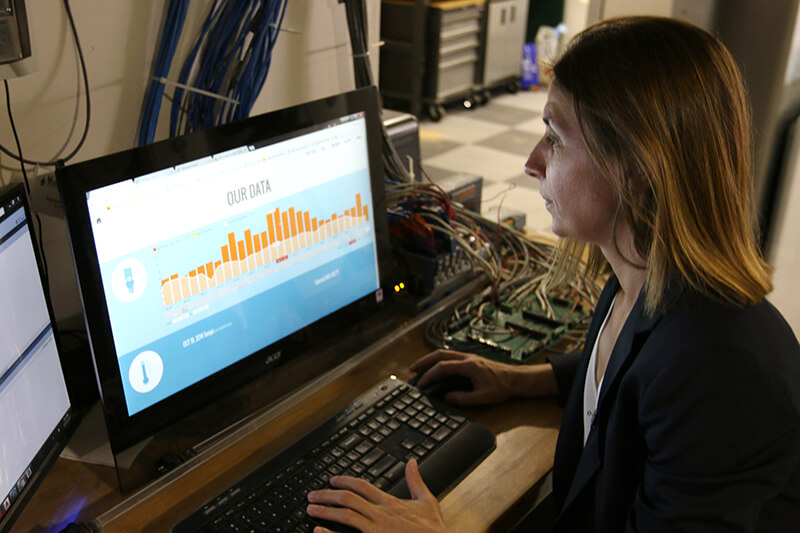October 12, 2017
Purdue faculty, Indiana housing pair up to research energy use
 Panagiota Karava, an associate professor of civil engineering, examines data collected at Purdue’s ReNEWW house, a “net-zero structure.” Karava received a grant to use smart devices to monitor energy use at homes in locations around Indiana. (Purdue University photo/Erin Easterling)
Download image
Panagiota Karava, an associate professor of civil engineering, examines data collected at Purdue’s ReNEWW house, a “net-zero structure.” Karava received a grant to use smart devices to monitor energy use at homes in locations around Indiana. (Purdue University photo/Erin Easterling)
Download image
WEST LAFAYETTE, Ind. — Residents in several Indiana communities are part of new Purdue research determining how households consume energy.
Panagiota Karava, an associate professor of civil engineering in the Lyles School of Civil Engineering, is heading up the four-year research project, which involves faculty from eight Purdue schools and departments.
The research will be conducted through several hundred households via an engagement partnership with the Indiana Housing and Community Development Agency and industry partners. Households are being utilized in, among other places, Lafayette, Indianapolis and Fort Wayne.
Karava recently received a $3.6 million award from the National Science Foundation’s Smart & Connected Communities program for the research. This project received the largest award from the $19 million distributed among 38 funding recipients.
“We’re hoping to be able to install smart and connected devices and get data from hundreds of households with a wide range of demographics and types of housing, from apartments to single houses,” Karava said, adding the work is ultimately aimed at developing energy-aware residential communities.
A YouTube video is available at https://youtu.be/jlKNZx5tPjI.
Karava is the principal investigator for the interdisciplinary research. She is joined by a number of faculty members from Purdue’s School of Mechanical Engineering, Department of Political Science, Brian Lamb School of Communication, Research Center for Open Digital Innovation, Department of Computer Graphics Technology, Department of Computer and Information Technology, and the Krannert School of Management.
The project will utilize web-enabled devices installed in the homes to monitor energy consumption due to heating, cooling, lighting, hot water and appliance use. The devices include smart energy meters, thermostats and sensors.
Anywhere from four to 10 devices will be installed per home, Karava said. Once energy consumption is determined, researchers will use large-scale data analytics and predictive modeling to formulate messages delivered with user-interactive devices, either through tablet displays, or verbal communication (such as the Amazon Echo).
“The messages will indicate how much you’re consuming and why, with additional messages perhaps getting your attention because you’re leaving the lights on or the thermostat is too high,” Karava said. “We’ll customize what we share with each unit. Maybe you respond better to visual analytics compared to verbal messages.”
The messages, also called feedback, are intended to motivate the residents to adopt energy conserving behaviors.
“We’re trying to generate this concept of community energy conservation,” Karava said. “The idea behind that is this information could be used, for example, to create community incentives, monetary or otherwise as well as energy policy programs.”
In community settings, Karava said the energy consumption information people receive about their homes and others in the community will prompt them to determine what else they can do to improve.
Through research advances, community engagement, and dissemination, this project will create a national model for smart and connected energy-aware residential communities. The findings regarding human behavior are expected to be utilized beyond energy use, with future uses ranging from transportation and economic development to environmental quality and urban planning.
Writer: Brian L. Huchel, 765-494-2084, bhuchel@purdue.edu
Source: Panagiota Karava, 765-494-4573, pkarava@purdue.edu
Note to Journalists: Broadcast-quality B-roll and photos are available at https://goo.gl/9dQQsn. For more information, contact Erin Easterling, digital producer in Purdue's College of Engineering, easterling@purdue.edu, 765-496-3388.

